Key takeaways:
- Selective mutism is an anxiety disorder that affects a child’s ability to speak in certain social situations, requiring understanding and supportive environments.
- School counselors play a crucial role by fostering a safe space, promoting awareness, and collaborating with parents and teachers to encourage communication.
- Effective communication can involve alternative methods, such as writing and art, and builds trust and connection, facilitating the child’s expression of feelings.
- Gradual exposure strategies and positive reinforcement help children gain confidence, transforming their school experience from silence to active participation.
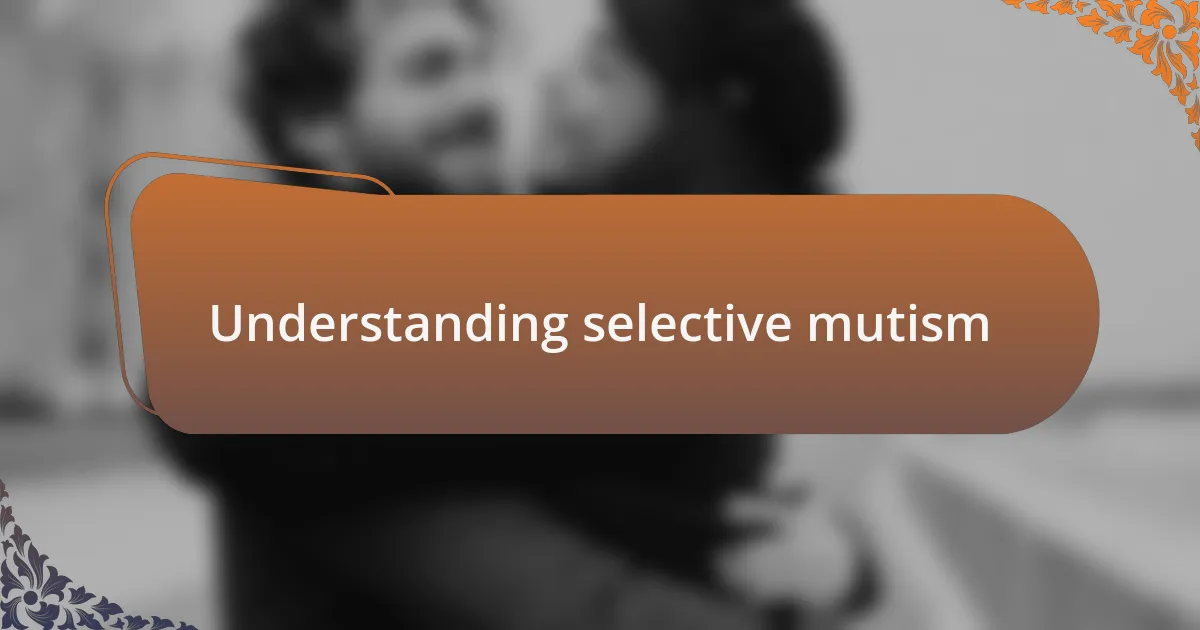
Understanding selective mutism
Selective mutism is more than just shyness; it’s a complex anxiety disorder affecting a child’s ability to speak in certain social situations. I vividly remember my own feelings of dread when it was time to speak up in class, a sensation that many parents may not fully grasp unless they have walked the same path.
When a child with selective mutism does not speak in environments like school but communicates freely at home, it can be incredibly perplexing. I often wondered why I felt so comfortable with close friends, yet the thought of uttering a word in front of classmates sent me into a spiral of anxiety. Have you ever felt trapped by expectations, struggling to express yourself even when you desperately wanted to?
Understanding selective mutism requires a compassionate lens; it is essential to acknowledge that the silence is not a choice but a coping mechanism. From my experience, supportive environments where children can gradually build confidence make a world of difference, helping them find their voice at their own pace.
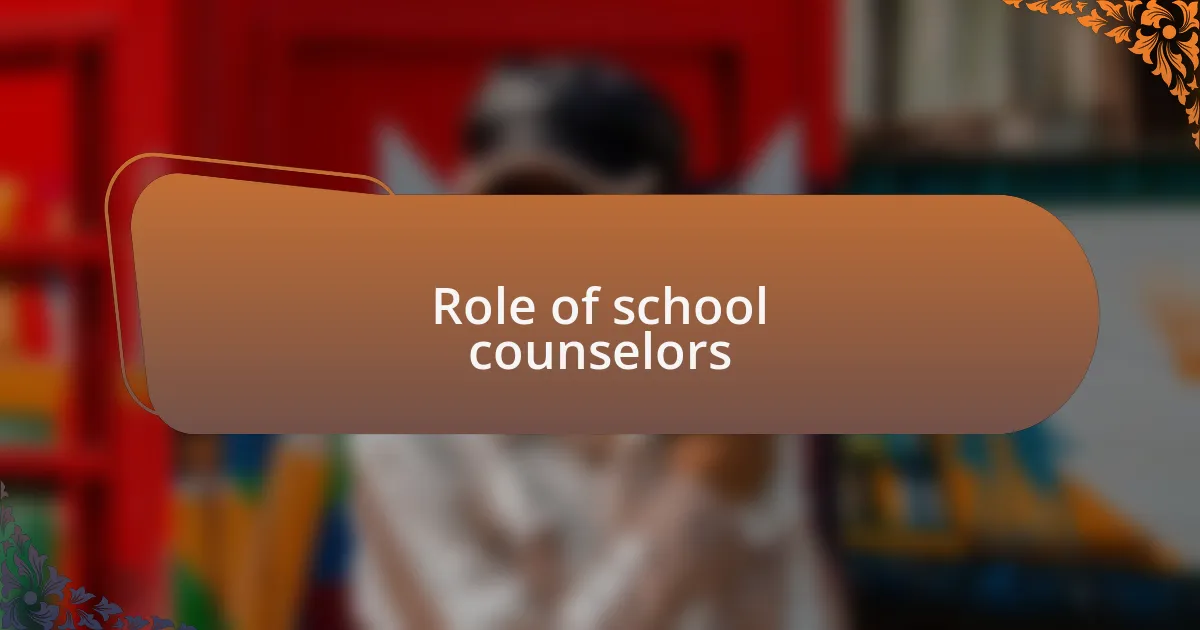
Role of school counselors
School counselors play a vital role in supporting children with selective mutism. They serve as advocates, fostering a safe environment that encourages open communication. I remember my counselor offering a quiet space where I felt less pressured to speak; it was a small but significant relief.
Through collaboration with teachers and parents, counselors can develop tailored strategies to help children gradually engage in speaking situations. I often felt reassured when my counselor discussed my progress with my parents, as it eased the worry that my silence would be misunderstood. It transformed the experience into a united effort rather than an isolating struggle.
Moreover, counselors can actively promote awareness about selective mutism within the school community. Their willingness to educate peers can create a culture of understanding and patience, enabling children like me to feel more comfortable. Have you ever witnessed how kindness and awareness can shift an atmosphere completely? For me, it changed everything.

Importance of communication
Effective communication is crucial for children with selective mutism. I remember moments when my counselor would gently encourage me to express my thoughts through writing or art, which felt much safer than speaking out loud. This alternative form of communication helped bridge the gap between my inner world and the outside one, allowing me to share my feelings without the fear of judgment.
In many instances, communication goes beyond words; it involves gestures, expressions, and even silence itself. I often found comfort in the non-verbal cues from my counselor, who understood when I needed time to process my feelings. Have you ever felt that someone understood you without you needing to say a word? That understanding made all the difference in my journey.
Establishing open lines of communication fosters trust and healing. I recall the times my counselor took the initiative to check in with me, simply asking how my day was going. Those small moments not only made me feel valued but also encouraged me to slowly open up about my experiences. Isn’t it fascinating how such a simple act can ignite a spark of connection?
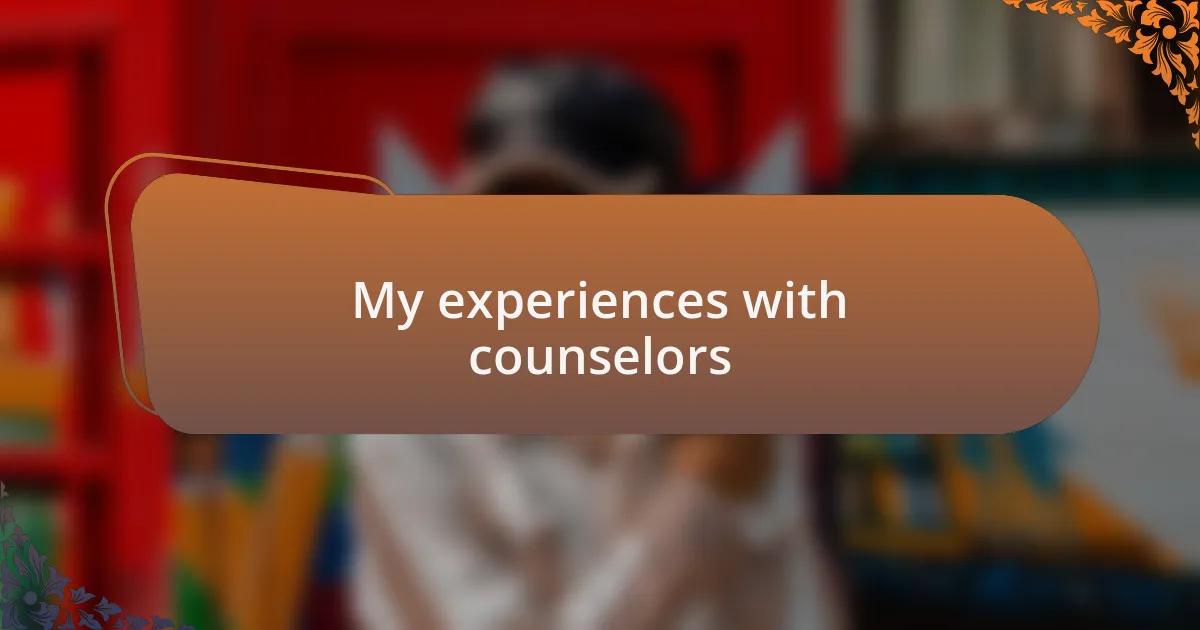
My experiences with counselors
My experiences with counselors varied widely, but one that stands out is a particular session where we focused on visualization techniques. I remember sitting there, eyes closed, as my counselor guided me to imagine a safe space, a secret garden where I could retreat. This exercise didn’t just offer me comfort; it helped me realize that I had the power to create my own sanctuary within myself, even when the outside world felt overwhelming.
Another memory that lingers is the day my counselor introduced simple role-playing scenarios to help me practice speaking in low-pressure situations. At first, I was hesitant and overwhelmed, but as we acted out different scenarios, I found myself laughing and feeling more comfortable using my voice. It was a revelation to see how stepping out of my comfort zone could actually be enjoyable—do you remember a time when trying something new opened up a world of possibilities for you?
Finally, the most impactful moments with my counselors often came from their unwavering support. There were days when fear and anxiety clawed at my chest, making it hard to even step into the counseling room. Yet, my counselor always greeted me with a warm smile and gentle understanding, creating a safe haven where I could just be me. Isn’t it amazing how a compassionate presence can provide the strength we often lack in challenging times?
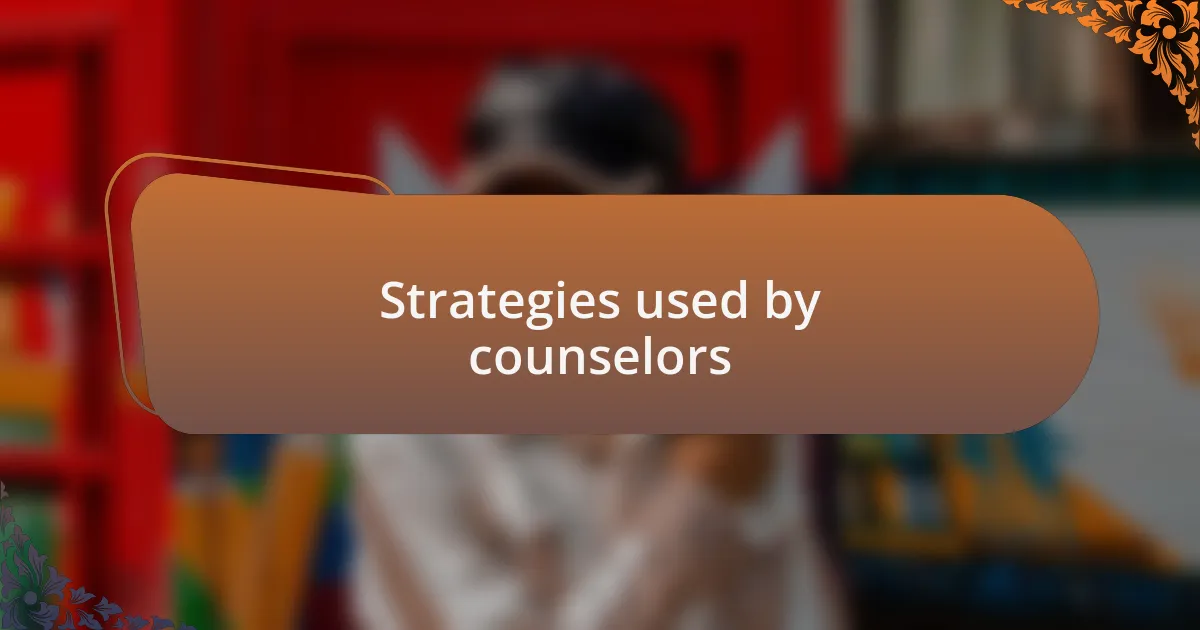
Strategies used by counselors
Counselors often use gradual exposure strategies to help students with selective mutism find their voice in various situations. In one session, my counselor encouraged me to speak aloud during our meetings, often starting with simple phrases. I recall the rush of anxiety I felt, yet her steady encouragement made it feel like a collaborative journey rather than a solitary struggle—ever had someone believe in you when you didn’t believe in yourself?
Another key strategy involves integrating social stories, which are personalized narratives that illustrate social interactions and expected behaviors. My counselor shared stories that mirrored my experiences, making it easier for me to navigate social scenarios. I remember reading a story about a character just like me who learned to ask for help in school. It was a simple tale, yet it resonated deeply—I found myself thinking, “If they can do it, why can’t I?”
Additionally, my counselor often employed the technique of positive reinforcement to celebrate small victories. Whenever I managed to say even one word in class, there was applause—sometimes just from her, but it felt monumental. This encouragement built on itself, and I started to see that each tiny attempt was a step forward. Have you ever celebrated a little moment that turned out to be a big deal in your journey? It’s those milestones that can make the process feel worthwhile and hopeful.
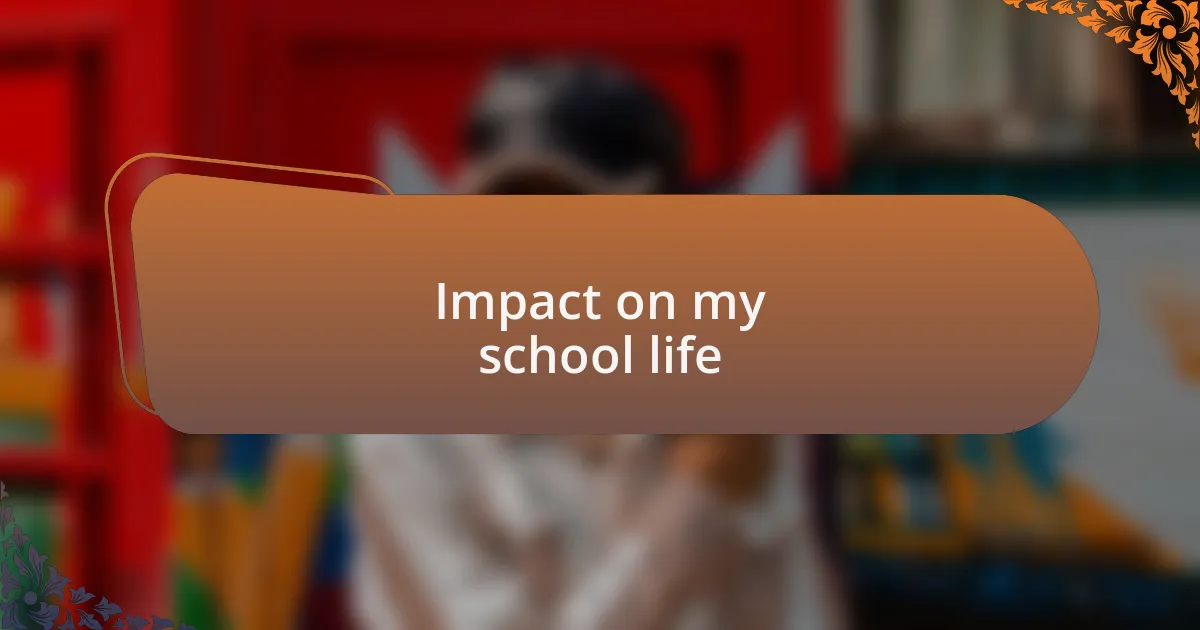
Impact on my school life
I vividly remember my first few weeks at school, where silence felt like my only shield. The noise of classmates chatting and laughing only amplified my reluctance to speak, making me feel isolated. In moments of group work, I often chose to nod instead of join in, wishing desperately for the courage to express my thoughts. Have you ever felt like a mere shadow in a room full of light?
When I started engaging more with my counselor, it was like someone had slowly cracked the door to my world. One memorable day, I was prompted to share a project idea with just one friend instead of the entire class. That small step transformed my view of school, helping me realize I could contribute without facing overwhelming anxiety. I still remember the relief mixed with exhilaration—it felt like breaking through a barrier I had long thought insurmountable. How does it feel to take that first step, for which you’ve waited so long?
Gradually, I learned that each small interaction added to my confidence. I would walk into class, feeling a flutter of anticipation and nerves, but also a glimmer of optimism thanks to the support I received. My role in class began to shift from the anxious observer to a more active participant. Isn’t it fascinating how our environment can change once we begin to challenge our fears? That knowledge changed everything for me, and I have no doubt it could for others too.

Lessons learned from my journey
Throughout my journey, I learned the profound importance of taking baby steps. There were days when I felt paralyzed by the pressure to speak. I started by whispering my thoughts to just one person, which was less daunting than facing a whole class. I remember the first time I successfully said my name aloud in a group; it felt like I had moved a mountain. How powerful is the impact of a single word?
Engaging with my counselor taught me the value of vulnerability. I used to think that sharing my fears would make me seem weak, but I soon realized that opening up created deeper connections. I recall one session when I revealed how scared I was to give presentations. Instead of dismissing my concerns, my counselor helped me practice in a safe space. That experience fortified my belief that sharing struggles can lead to strength, not weakness. Have you ever found that expressing your concerns brings unexpected support?
Lastly, I discovered that patience is vital in the journey toward overcoming selective mutism. Progress felt painfully slow at times, but I learned to celebrate each small victory—from speaking up in a group chat to asking a question in class. With each step, I understood that growth isn’t always linear; it’s a winding path filled with twists and turns. Isn’t it refreshing to realize that every small victory counts on this journey?